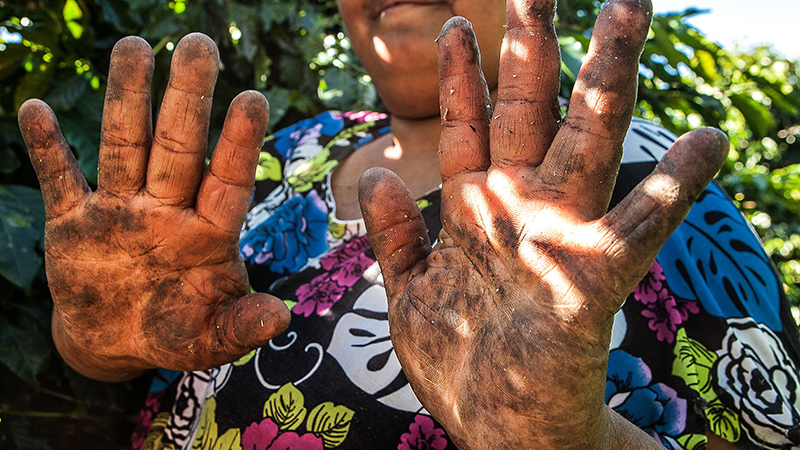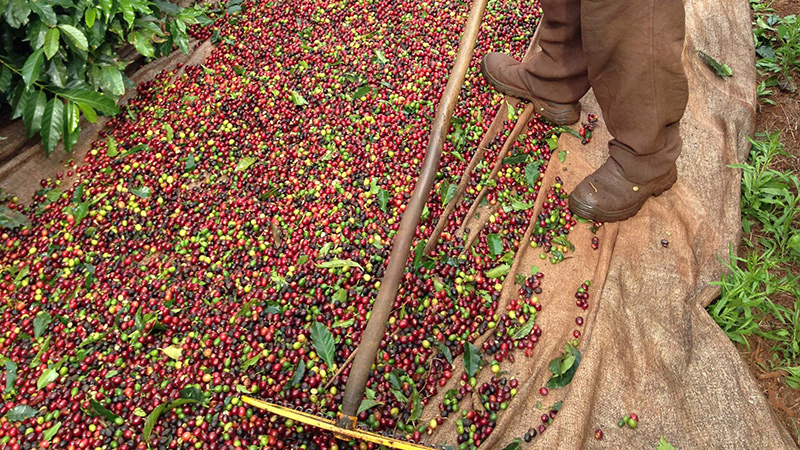Eight months after slave labor was discovered at the Cedro II farm in the Brazilian state of Minas Gerais, Starbucks and Nestlé-controlled brand Nespresso — both of whom had quality certified the farm — said they would stop sourcing coffee there.
The decision by the two transnational companies came after the publication of the government’s April “Dirty List” of employers — those caught with labor conditions analogous to slavery. The Dirty List is released biannually by what was previously the Ministry of Labor, now part of the Ministry of Economy, and the the first update under President Jair Bolsonaro.
The April Dirty List includes 48 new employers. One of them is coffee producer Helvécio Sebastião Batista, who had been certified with Nespresso and Starbucks quality seals and used to provide coffee for both brands.
Nespresso responded: “In the light of the last report of the Ministry of Labor, we immediately suspended business with the producer in question and we will investigate the case. Farms providing coffee to the company are rigorously evaluated and inspected every year to meet the program’s criteria. We will not accept otherwise and there will be no exception.”

A worker’s hands injured by long hours of coffee harvesting (Image: Lilo Clareto / Repórter Brasil)
Starbucks responded, saying it will look into the incident and that it has suspended the farm from its supplier list because of the charges. The company, which boasts the world’s largest chain of coffee shops, says the farm’s practices previously complied with the C.A.F.E. certification seal, which follows “ethical and sustainable standards” developed in partnership with Conservation International and overseen by SCS Global Services. The next evaluation of the farm included in the Dirty List is expected to take place in September 2019.
This wasn’t the first time that auditors found slave labor at a Starbucks-certified coffee farm. In August of 2018, Repórter Brasil reported that 18 workers had been found in conditions similar to slavery at the Córrego das Almas farm, also known as Fartura. In September, Mongabay co-published that story.
The operation carried out by labor inspectors at the Cedro II farm in July 2018 found six employees in dire working conditions. Some were forced to work 17-hour shifts, from 6am to 11pm, and slept in substandard unhygienic housing, according to the government inspectors who rescued them.

Cedro II farm owner and manager, Helvécio Sebastião Batista, claims the charges filed against him are unfounded. “I’ll do what I have to do. I filed a petition for a writ of mandamus, and I paid no fine,” Batista said regarding his intention to appeal the Ministry’s decision through the judicial system. A writ of mandamus is an order seeking to remedy defects of justice.
Meanwhile, at Cedro II and other properties managed by Batista, labor inspectors have found 19 more workers in slavery-like conditions, in addition to the six that caused his property’s inclusion on the Dirty List. Those properties lacked proper toilets and had no kitchen facilities. The workers also reported working exhaustive hours, in some cases until 11pm, often without their mandatory weekly day off.
In addition to holding Nespresso and Starbucks seals of good practice, Batista said that his farm was certified by Rainforest Alliance, which in turn informed Repórter Brasil that it would suspend its certification.
Cases of labor conditions analogous to slavery on coffee farms are recurrent. In 2018 alone, 210 workers were found in such conditions by inspectors. The number of workers toiling in slave-like working conditions in Brazil’s coffee industry is now at the highest level in 15 years, according to Ministry of Labor statistics.
More about the Dirty List
With its new additions, the Dirty List” now includes 187 employers caught exploiting labor in conditions similar to slavery. According to Article 149 of Brazil’s Criminal Code, four elements define contemporary slavery: forced labor (which involves restricting freedom of movement); debt bondage (captivity linked to debts, often fraudulent ones); degrading conditions (work that denies human dignity, endangering a worker’s health, safety and life); or exhausting working hours (leading workers to total exhaustion as a result of extreme exploitation of labor, also endangering their health, safety and lives).
The 48 companies newly included on the April 2019 Dirty List were monitored between 2014 and 2018. Before being added to the list, employers have a right to defend themselves with the Ministry of Economy.
Employers whose appeals fail remain on the list for two years. When they strike deals with the government, employer names are placed on a “watch list,” and they may be excluded altogether after a year if they honor their commitments.
Investors, along with public and private banks, use the Dirty List to conduct risk analyses. Some Brazilian and international companies choose to avoid doing business with listed firms.

